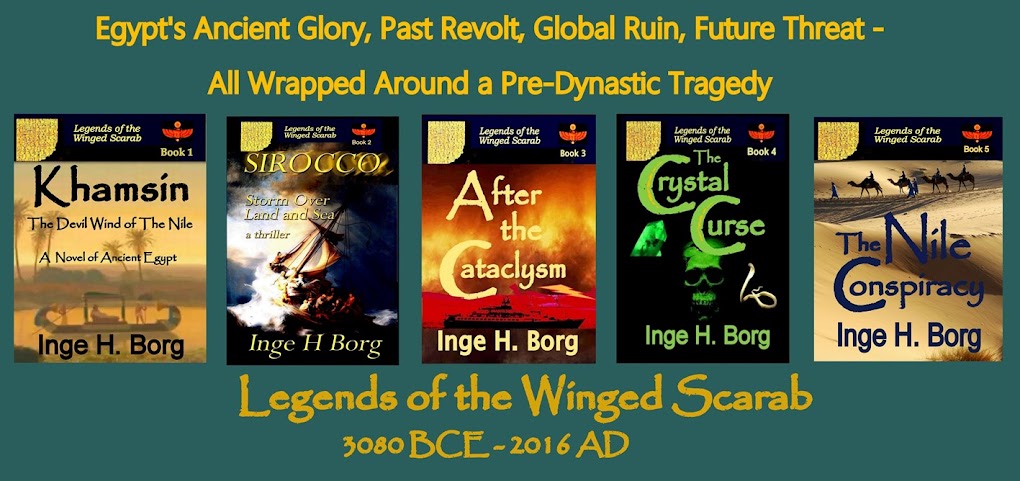Recently,
I was asked about my “most cherished words.” I admit that I am most partial to
my Prologues. They set the mood, introduce foreboding, and even help clarify my
titles.
When, years ago, a self-appointed ARC reader (alas, a veritable Mr.
Malaprop) tried to mess with the prologue for Khamsin,
I fiercely declared my words as untouchable. He circled the passage in red and
wrote “Holy” into the margin. Darn right!
(In
a few days, I shall show you some amusing “edits” Mr. Malaprop attempted in the original manuscript; it’s
funny now, but for sure wasn’t at the time, believe me.)
* * *
Prologue from Khamsin,
The Devil Wind of The Nile
(Book 1 – Legends of the Winged Scarab – 3080 BC)
Rih
al-Khamsin!”
It
was an eerie howl rather than a cry. It multiplied, and it traveled fast. The
urgency of the warning sent the inhabitants of the far-flung settlements
scurrying. In great haste, children were collected, drinking wells covered, and
home sites secured. All against the onslaught of the feared wind whose
turbulent airs had gathered strength from far away.
Its
father, the Sirocco, was spawned over the hot desert. Before it abandoned its
cyclonic origins to reach across the vast stretches of the Great Green Sea,
clawing young islands along the way, racing toward the densely forested virgin
coast of the primitive Northern Continent, it gave birth to its unbridled son
Khamsin, the Devil Wind of the Nile.
This
new turbulence then grew into adolescence over the desolate sandy expanses of
the great desert, gathering strength and hot dust, reaching merciless maturity
as it slammed into the broad Valley of the Nile. With the Khamsin’s arrival,
the populace knew to expect accompanying sand storms; and swarms of vermin
covered the ground bringing widespread devastation to the already parched land.
Only
when the Great Wind’s hot fury was spent, did its evil spirits seem appeased,
and the land and its people could breathe anew, and anticipate the life-giving
flooding of their river once again.
Just
as once again, the principles of Ma’at would be adhered to. It was their
cornerstone of all life, of all culture. Its teachings were to suppress all
chaos stemming from ones emotions, feelings and reactions. To keep life in
absolute order. No deviation was permitted. Those who offended its strict laws
were severely punished—often by a cruel death.
But
during those enervating days when the incessant wind raged, Ma’at was
often breached; usually calm tempers flared; violent crimes were committed. And
it was said, that people vanished without a trace.
* * *
Anybody dare to comment? (I promise, I won't bite)
* * *









